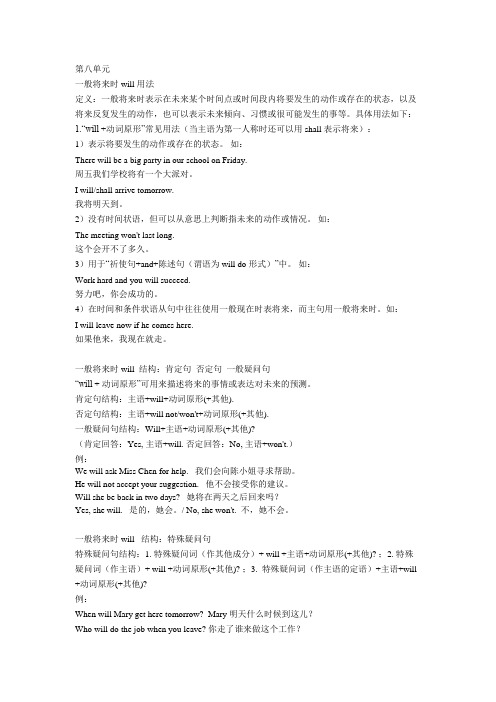一般将来时will的用法
will作动词的四种形式

will作动词的四种形式Will作为动词有四种形式:will, will have, will be, will be having。
下面将分别对这四种形式进行解释和举例说明。
1. willwill作为一般将来时的情态动词,表示将要发生的动作或存在的状态。
它用于表示主观的意愿、决心、承诺、预测、推测等。
例如:- I will go to the concert tomorrow.(我明天会去听音乐会。
)- She will help you with your homework.(她会帮你做作业。
)- They will arrive at the airport at 6 PM.(他们会在下午6点到达机场。
)2. will havewill have用于表示将来某一时间点之前已经完成的动作。
它表示对将来某一时刻或某一动作的预测或推测。
例如:- By the time you arrive, I will have finished cooking dinner.(等你到达的时候,我会已经做好晚饭了。
)- She will have graduated from university by next year.(她到明年会已经大学毕业了。
)- They will have arrived at the hotel before noon.(他们到中午之前会已经到达酒店。
)3. will bewill be用于表示将来某一时刻正在进行的动作或存在的状态。
它表示对将来某一时刻的预测或推测。
例如:- I will be studying for the exam this time tomorrow.(明天这个时候我会正在备考。
)- She will be working at the office all day tomorrow.(明天一整天她会在办公室工作。
)- They will be traveling around Europe next month.(下个月他们会在欧洲旅行。
will表“将来”的用法

D.win
Ⅱ.在 空 白处 填人适 当的词补 全对话 。
1.A:W ill there be a school in two years?
B t Yes,
—
—
—
—
.
2.A :
get up at six o'clock tomorrow morning?
—
—
—
—
B :Yes,I u.
3.A :
晤
否 定句 :There will+not+be+主语 +其 他 。例如 : There won't be a meeting next week.下周 不会 有会 议 。 一 般 疑 问句 :Will+there+be+主语 +其他 ?
回 固
—
—
—睁· 墨7_ 簪镬鞠_一
一
一 ~
圆 圈 圆 圈
酉妇
肯 定 回答 :Yes,there wil1.
否定 回答 :No,there won’t.例如 :
ere be sehools in the future?将 来会有 学 校2 7
一
- Yes,there wil1./No,there won't.是 的 ,有 。,不 ,没有 。
商 人 与行李
一 个 商人 拖着 他那 鼓鼓 囊囊 的特 大 号旅行 袋登 上 飞机 。真够 费 劲
的。在一 位机 组乘 务员 的帮 助下 ,他终 于设 法将 旅行 袋放 进 了头顶 上 的
~ 行李 箱 。“你 总是携 带这 么重 的行 李 ?”她 叹息道 。 “再也 不会 了 ,”那 人说道 ,“下次 ,我 待在旅行 袋里 ,我 的同伴 买票 !”
The Businessm an and His Luggage
一般将来时will的用法

一般将来时是一种常用的英语时态,表达的是将要发生的事情。
使用will可以表示将来时的意义。
以下是一般将来时will的用法:
1. 表示将来要发生的动作或存在的状态。
例如:“I will arrive at 6 o'clock tomorrow morning.”(我将在明天早上6点到达。
)
2. 表示一种意愿、意图或决定。
例如:“He will not come to the meeting.”(他不会参加会议。
)
3. 表示一种预测或假设。
例如:“It will rain tomorrow.”(明天会下雨。
)
4. 表示一种习惯或常规。
例如:“They will have breakfast at 7 o'clock every morning.”(他们每天早上7点吃早餐。
)
5. 表示一种委婉的建议或请求。
例如:“Would you mind closing the window, please?”(请关上窗户好吗?)
需要注意的是,一般将来时并不一定都使用will,有时也会使用其他表达方式,如be going to do、be about to do等。
同时,will 也可以与其他情态动词一起使用,如may、might、should等。
一般将来时特殊用法集合

一般将来时的一些特殊用法以下是一些一般将来时态的特殊用法:一、will/shall一般将来时的特殊用法will和shall表示一般将来时的特殊用法主要有以下几种:1. 表示意愿或决心:will可用于表示个人的意愿或决心,表示将来的行动或状态。
例如:“I will do my best to help you.”(我会尽最大努力帮助你。
)2. 表示祝福:在表示祝福或祈祷的语境中,will可用于表示对未来的美好愿望。
例如:“God will bless you.”(愿上帝保佑你。
)3. 表示请求或命令:在书面语或正式场合中,shall可用于表示请求或命令,表示将来的行动或要求。
例如:“You shall not pass.”(你不许过去。
)4. 表示不可避免的情况:shall可用于表示将来不可避免的情况或结果,强调客观事实或命运的决定。
例如:“What will be, will be.”(该发生的事总会发生。
)5. 表示条件:在条件状语从句中,will可用于表示将来的结果或条件。
例如:“If you will help me, I will thank you.”(如果你愿意帮助我,我会感谢你。
)需要注意的是,在使用will和shall时,应根据语境和上下文选择合适的用法。
此外,在现代英语中,will是更为常用的表达一般将来时的助动词,而shall 的用法相对较少,多用于表示法律、条约、合同等正式文件中的规定和条款。
二,表示一般将来时的特殊构成方式还有:1. be going to:表示按照计划或安排将要发生的事情,也可以表示根据目前的迹象或情况预测将会发生的事情。
例如:“It is going to rain this afternoon.”2. be about to:表示某件事情即将发生,时间非常紧迫,几乎就在眼前。
例如:“I am about to leave for work.”3. be+动词不定式:表示计划或安排将来要做的事情。
一般将来时will的用法

用will表示承诺和要求
Will也常用来表示承诺和要求。它可以表达你对某件事的承诺,或者向他人提 出请求。例如: I will finish the report by tomorrow. Will you please pass me the salt?
用will表示预测和推测
Will还可以用来表示预测和推测。它可以表达对未来情况的猜测或预测。例如:
用will表示安排和计划
Will也常用来表示安排和计划。它可以表达你将要做某事,并已经安排好了。例如: I will meet you at the airport tomorrow. They will have a meeting at 3 PM.
用will表示习惯和经验
Will还可以用来表示习惯和经验。尽管它是将来时,但在这种情况下表示的是 过去经常发生的动作或情况。例如: When I was young, I will go swimming every weekend. He will always eat lunch at his desk.
在口语中使用will时,有一些常见错误要避免。例如: 错误:I will g o to the park tom orrow. (不要用will来表示明确的计划或安 排。) 正确:I'm g oing to the park tom o rrow.
常见的缩略形式
在口语中,will有一些常见的缩略形式。例如: I'll go to the store later. She won't be able to come tomorrow.
肯定句的构成
在一般将来时的肯定句中,主语后面跟上will动词,然后是动词的原形。例如: I will study for the exam. He will travel to Europe next month.
一般将来时:will

第八单元一般将来时will 用法定义:一般将来时表示在未来某个时间点或时间段内将要发生的动作或存在的状态,以及将来反复发生的动作,也可以表示未来倾向、习惯或很可能发生的事等。
具体用法如下:1.“will +动词原形”常见用法(当主语为第一人称时还可以用shall表示将来):1)表示将要发生的动作或存在的状态。
如:There will be a big party in our school on Friday.周五我们学校将有一个大派对。
I will/shall arrive tomorrow.我将明天到。
2)没有时间状语,但可以从意思上判断指未来的动作或情况。
如:The meeting won't last long.这个会开不了多久。
3)用于“祈使句+and+陈述句(谓语为will do形式)”中。
如:Work hard and you will succeed.努力吧,你会成功的。
4)在时间和条件状语从句中往往使用一般现在时表将来,而主句用一般将来时。
如:I will leave now if he comes here.如果他来,我现在就走。
一般将来时will 结构:肯定句否定句一般疑问句“will + 动词原形”可用来描述将来的事情或表达对未来的预测。
肯定句结构:主语+will+动词原形(+其他).否定句结构:主语+will not/won't+动词原形(+其他).一般疑问句结构:Will+主语+动词原形(+其他)?(肯定回答:Yes, 主语+will. 否定回答:No, 主语+won't.)例:We will ask Miss Chen for help. 我们会向陈小姐寻求帮助。
He will not accept your suggestion. 他不会接受你的建议。
Will she be back in two days? 她将在两天之后回来吗?Yes, she will. 是的,她会。
一般将来时will的用法
4. I am checking my email. (用will改 写句子) I w_i_ll__c_h_ec_k_ my email tomorrow.
5. There is a class meeting every Tuesday. (用tomorrow改写句子) There _w_i_ll _b_e_a class meeting t_o_m_o_r_ro_w_.
⑤
⑥
_ch_e_ck_h_e_r _em__ai_l
h_a_v_e _a _pi_an_o_l_es_s_on__ _ha_v_e_a_p_ic_ni_c
Exercises
请根据句意选择正确的选项填空。
1. We'll _C__ at the school gate.
A. meets B. meeting C. meet
“will”的否定句:
They won't use books. The teachers won't write on the blackboard .
否定句:主语+ will not (won't) +动词原形
Please make sentence using will at the weekend
4).Jim and Lilli will have a picnic at the weekend.
Please make sentence using won't
teacher use chalk on the blackboard
students use pen and paper
have a lot of homework
check my email
一般将来时will结构讲解
语法点1:一般将来时will结构基本句型1.句型:主语+will+do(动词原形)+(宾语)+其它成分+将来时间状语表示主语在将来某个时间将要做某事。
2.will是构成一般将来时的助动词,有词义,意为“将,将要”,其后须接动词原形do,will+do构成句子的复合谓语。
3.时间状语:tomorrow,the day after tomorrow,in+一段时间,soon,next week/day/month/year等表将来的时间状语。
例句呈现He will play baseball with his classmate tomorrow.They will talk about the holiday plan tonight.The children will learn 300 Poems of Tang.语法点津(一)句型解读句型:主语+will+do(动词原形)+(宾语)...+将来时间状语1.表示主语将要做某事。
I will buy some books next week.We will try our best to win the game.2.do指动词原形。
助动词will后须接动词原形。
She often helps me with my English.She will help me with my English.The family spent the winter holiday in San Ya last year.一般过去时The family will spend the winter holiday in San Ya next year.一般将来时3.will没有人称和数的变化。
现代英语里,助动词will通用各种人称。
We will help them to raise money for the people in need.Tom will be in the long jump.You will get well soon.4.表将来的时间状语,如tomorrow,next week等。
(完整版)will的用法
一要注意will表示的意义和人称要求。
will表示“将来”,常用于一般将来时中,其后跟动词原形;在书面语中,主语是第一人称I / we时,常用shall.在口语中,所有人称均可用will.否定式是will not(缩略式为won’t)。
例如:He will be back in ten minu-tes. 十分钟后他将回来。
I shall/will come to see you this evening. 今晚我将来看你。
They won't go swimming again. 他们将不再去游泳。
【旁白】will 一般用于较正式的文体,而be going to多用于口语中,表示按计划、安排将要发生的事情。
例如:-Where are you going?—I’m going to buy some books。
二要注意will在there be句型中的形式及其句式变换。
由于“一般将来时”的结构可以用“will+动词原形”来表示,所以there be句型的一般将来时的形式就是there will be。
例如:There are many students in our school。
→There will be many students in our school.there will be的句式变换可以用下面的顺口溜来帮你记忆:⑴表示“将来……”很容易, there be换成there will be;⑵若是用于否定句,一定要用there won’t be;⑶要变为一般疑问句,只把will句首提;⑷遇上简答没问题, 用上there will或there won’t就可以。
例如:⑴There is some pollution in our hometown. →There will be some pollution in our hometown.⑵ There will be more cars in ten years。
一般将来时用法总结
一般将来时用法总结一、一般将来时的定义一般将来时表示将来某个时间要发生的动作或存在的状态,常与表示将来的时间状语连用,如tomorrow(明天),next week(下周),in the future(在将来)等。
二、一般将来时的构成1. will+动词原形- 肯定句:主语 + will+动词原形+其他。
- 例如:I will go to school tomorrow.(我明天将去上学。
)- 否定句:主语+will not(won't)+动词原形 + 其他。
- 例如:He won't come to the party tonight.(他今晚不会来参加聚会。
) - 一般疑问句:Will+主语+动词原形+其他?- 例如:Will you play football this weekend?(你这个周末将踢足球吗?) - 回答:Yes, I will. / No, I won't.2. be going to+动词原形- 肯定句:主语+be (am/is/are)+going to+动词原形+其他。
- 例如:She is going to visit her grandparents next month.(她打算下个月去看望她的祖父母。
)- 否定句:主语+be (am/is/are)+not+going to+动词原形+其他。
- 例如:They are not going to have a meeting this afternoon.(他们今天下午不打算开会。
)- 一般疑问句:Be (am/is/are)+主语+going to+动词原形+其他?- 例如:Are you going to do your homework tonight?(你今晚打算做你的家庭作业吗?)- 回答:Yes, I am. / No, I'm not.三、一般将来时的用法1. 表示将来的计划或打算(be going to侧重于计划打算;will侧重于意愿)- I'm going to study hard this term.(我打算这个学期努力学习。
- 1、下载文档前请自行甄别文档内容的完整性,平台不提供额外的编辑、内容补充、找答案等附加服务。
- 2、"仅部分预览"的文档,不可在线预览部分如存在完整性等问题,可反馈申请退款(可完整预览的文档不适用该条件!)。
- 3、如文档侵犯您的权益,请联系客服反馈,我们会尽快为您处理(人工客服工作时间:9:00-18:30)。
the teachers by email? ——Yes, they will. / No , there won’t. 一般疑问句:—Will+主语+动词原形?
Yes①,he/she /they…②will. No, he/she③/they… won’t
_go__ov_e_r_le_s_so_n_s h_e_lp__w_it_h_th_e_h_o_u_se_w_o_r_k __se_e_a_m__ov_i_e
④
⑤
⑥
_ch_e_ck__h_er_e_m_a_il h_a_v_e_a_p_ia_n_o_l_es_so_n_ _ha_v_e_a_p_i_cn_ic
The Simple Future Tense
一般将来时
will 的基本用法
Teaching aims:
学会一般将来时will 的陈述 句, 否定句, 一般疑问句及 回答。
Please make sentence using will at the weekend
check my email
have a party
“will”的否定句: They won’t use books. The teachers won’t write on the blackboard
否定句:主语+will not (won't) +动词原形
“will”的一般疑问句:
——Will there be schools in the future? ——No, there won’t. 一般疑问句:—Will+there+be+……?
Step 4 Summary
“will”的肯定句:
Everyone will study at home. Everyone will have a computer on their desk.
“will”引导的“一般将来时”表示未来的 事实或对未来的预测等。 肯定句:主语+ will+ 动词原形
Look at the pictures and make sentence using be going to…
—I/She/He/They am/is/are going to…
swim
play table tennis
cook
play basketball watch TV go over lessons
Look at the pictures and make sentence using will…(at the weekend)
I,/ He,/ She, /We, /They will ….
do her homework
Damming
stay in bed have a picnic have a party
Please make sentence using won’t in the future
teacher use chalk on the blackboard
students use pen and paper
have a lot of homework
There is a school.
1).Teacher won’t use chalk on the blackboard in the future.
have a picnic
stay in bed
On Sunday…
buy some clothes
play the piano
Exercises
请根据句意选择正确的选项填空。 1. We’ll _C__ at the school gate.
A. meets B. meeting C. meet 2. Each of the students will _A__ a
computer on their desk. A. have B. has Байду номын сангаас. having
—Yes,主语+will./No,主语+won’t.
Talk about your plans at the weekend using will
have a piano lesson
check my email
On Saturday…
do my homework
go over the lessons
2). Students won’t use pen and paper in the future .
3).Students won’t have a lot of homework in the future .
4).There won’t be school in the future.
Talk their plans at the weekend using Will he/ she/ they/ Lilli/ Jim/ you …?
1).Will he go over lessons at the weekend? Yes, he will./ No, he won’t. 2).Will she help with the housework at the weekend? Yes, she will./ No, she wont. 3)Will they see a movie at the weekend? 4).Will she check her email at the weekend? 5).Will Jim have a piano lesson at the weekend? 6). Will they have a picnic at the weekend?
stay in bed
have a picnic(野餐)
1).I will check my email at the weekends.
2).They will have a party at the weekend.
3).He will stay in bed at the weekend.
4).Jim and Lilli will have a picnic at the week end.
